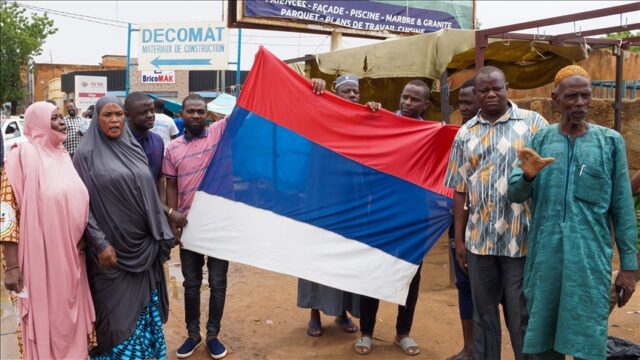
Brief: Russian Wagner Group Faces Increasing Attacks From Sahelian Jihadists Amid Coup Fallout
Publication: Terrorism Monitor Volume: 21 Issue: 18
By:

Amid ongoing coup contagion in West Africa, the region’s new military regimes—especially in Mali, but possibly in Burkina Faso and Niger in the future—are eyeing Russia, and particularly the Wagner Group, as potential partners in counter-insurgency support. Russia is more than willing to play a part in displacing French influence in the region, as the new military regimes, like Russia itself, have been sanctioned by Western countries. Most exemplary of this trend was the raiding of the French embassy in Niamey, Niger by hundreds of Nigeriens who on the day of and in the days prior to the raid, chanted anti-France slogans while holding Russian flags (lemonde.fr, July 30). They were also goaded by the coup leaders, who declared France “not welcome” and revoked the diplomatic immunity and credentials of its ambassador (france24.com, September 1).
However, the rising influence of the Wagner Group and declining influence of France has also meant that the two main jihadist groups operating in the Sahel, al-Qaeda-affiliated Group for Supporters of Islam and Muslims (JNIM) and Islamic State in the Greater Sahara (ISGS), are now targeting the Wagner Group. Given that France can no longer be labeled as a foreign interloper in the Sahel like in previous years, the jihadists are now focusing their attention on the Wagner Group. Moreover, the opportunities afforded by French military targets have now been eliminated or are otherwise being reduced, whereas Wagner troops are entering the region and becoming more viable targets for JNIM and ISGS to attack.
For example, on August 29, JNIM attacked the airport in Timbuktu and justified the operation as preventing the Wagner Group from landing its troops at a local “haven,” the base from which it provides support to the leaders of the Malian military regime (Twitter/@IbnSiqilli, August 30). Only one week prior to that operation, JNIM also accused the Wagner Group of carrying out a “massacre” in Burkina Faso and used the opportunity to call for a “general mobilization” of more jihadists to combat the Wagner Group (Twitter/@SimNasr, August 21). ISGS, meanwhile, has accused civilians of being “spies” for the Wagner Group—which is used as a justification for their execution (Twitter/@Fibrik_Oficial, August 9).
Prior to the suspicious August 23 death of the Wagner Group’s leader, Yevgeny Prigozhin, in Russia (see EDM, September 6), Prigozhin had allegedly been seen at a Sahelian airbase, where he made a video that assured viewers that the Wagner Group would be deepening its presence on the continent (rfi.fr, August 24). His death, however, makes it unclear whether the Wagner Group will maintain its momentum in Africa without Prigozhin’s leadership and connections. The Russian Foreign Ministry nevertheless has provided assurances since his death that the Wagner Group’s operations in Africa will not be disrupted (africanews.com, August 25).
The main competitor to Russia’s rising influence in Africa is China. China’s state-owned defense company, China North Industries Corporation (Norinco), for example, concluded a large-scale weapons supply agreement with Senegal earlier this year, which included armored vehicles and light weaponry. Furthermore, Norinco was reported to be planning similar deals with post-coup West African governments in August (senenews.com, August 29). China also uses an extensive network of private security contractors (PSCs) to safeguard its geo-economic interests in the region (to read more, see Guardians of the Belt and Road). China is benefitting from the expulsion of France from multiple West African countries and the sanctions on Russia, which limits the latter’s ability to supply weapons. China lacks these problems to a large extent, and has the ability and the ambition to raise its profile in Africa.



